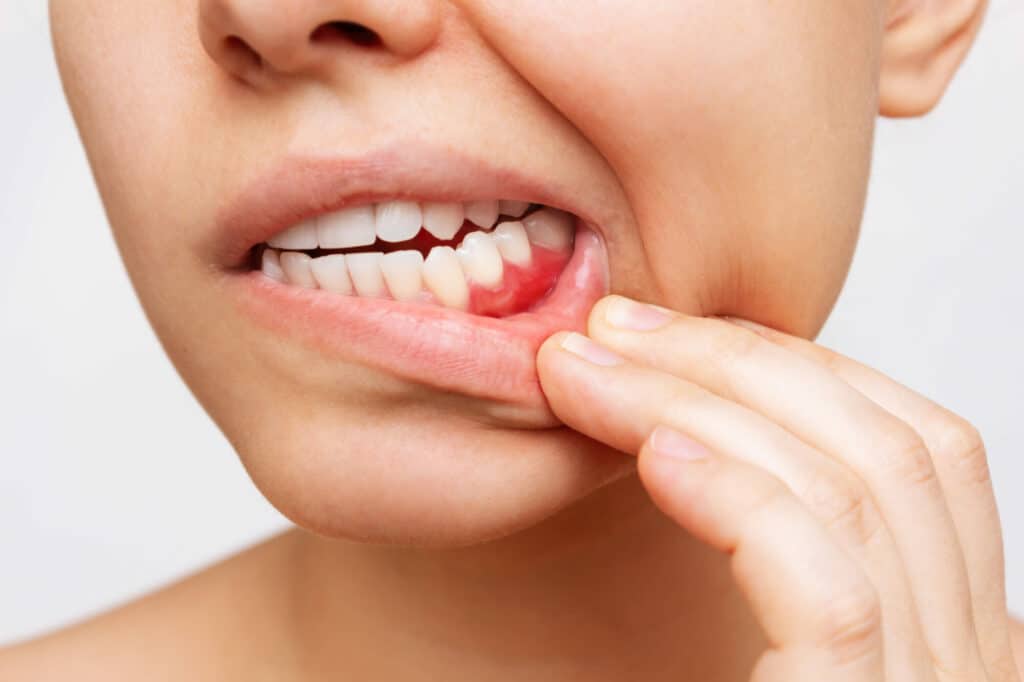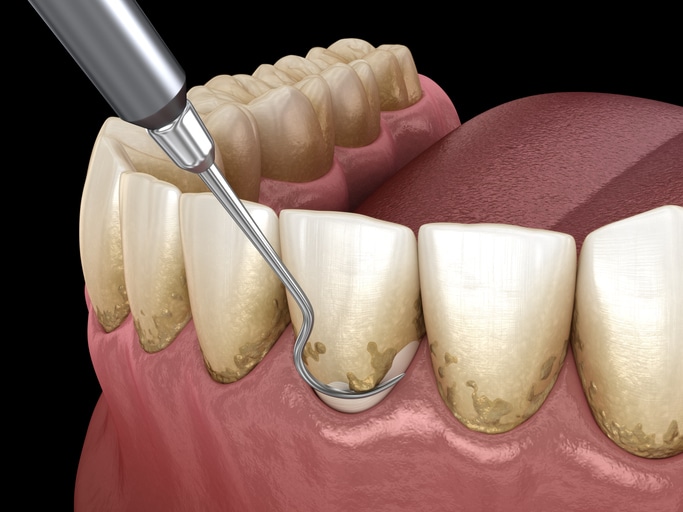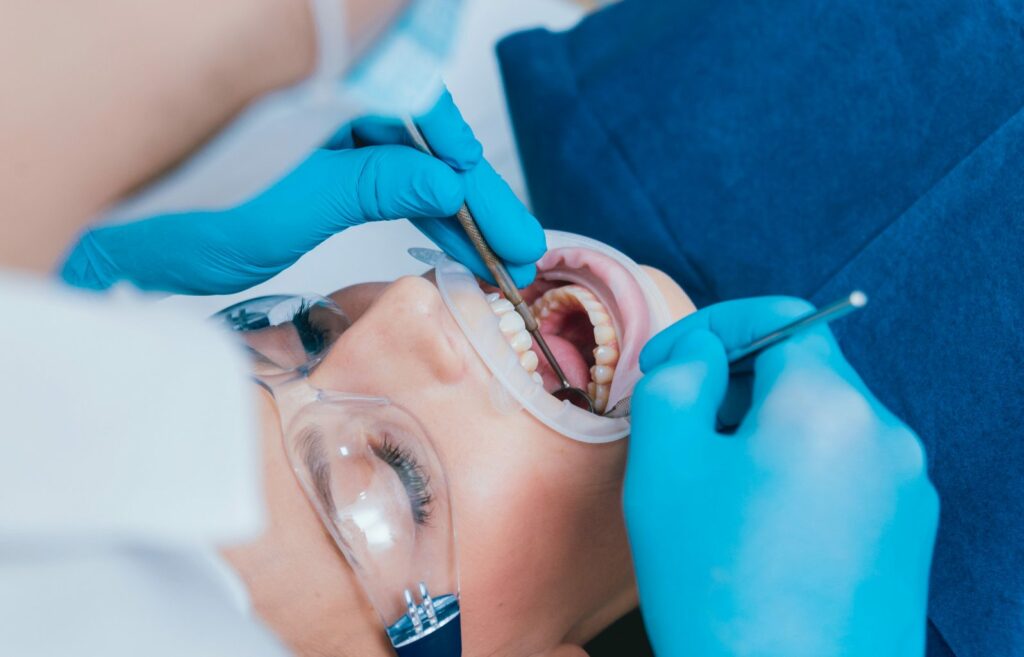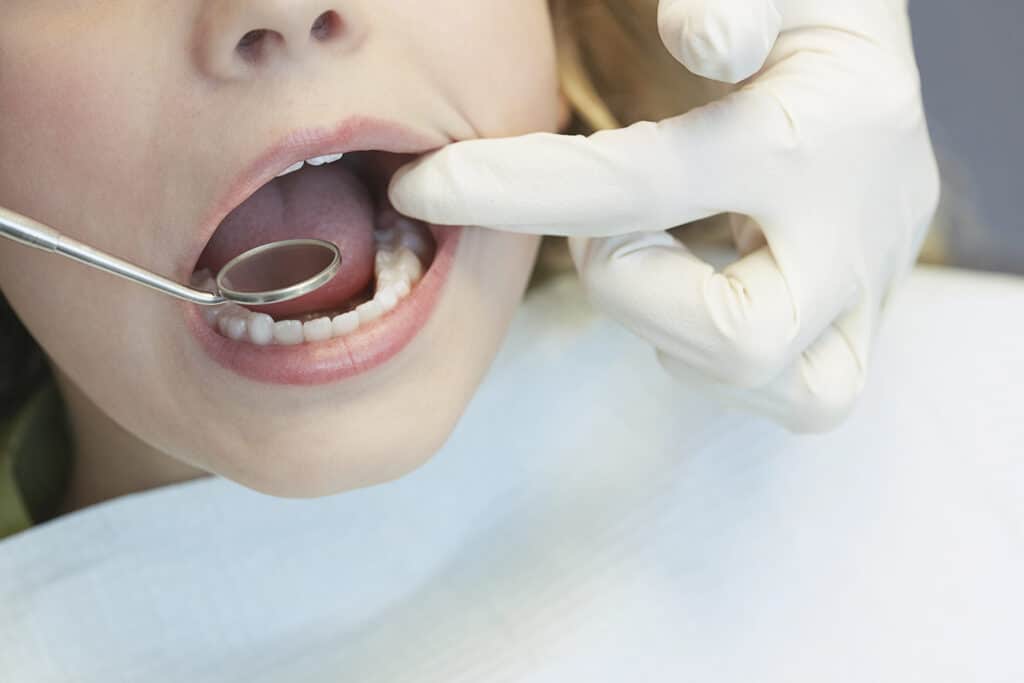Periodontal Care / Gum Therapy

What Is Periodontal Disease?

Periodontal disease, commonly known as gum disease, is a prevalent dental condition stemming from the accumulation of bacteria. These bacteria initiate the breakdown of gum tissue and can lead to jawbone loss in severe instances. Gum disease manifests in three stages:
- Gingivitis | Gingivitis marks the earliest stage of periodontal disease, triggered by plaque buildup on the teeth and gums. Symptoms include gum inflammation, persistent bad breath, and bleeding gums during brushing or flossing. Regular dental visits for examination and professional cleaning are crucial, as gingivitis can be managed with improved oral hygiene practices.
- Periodontitis | Periodontitis denotes the advanced stage of gum disease, characterized by continued plaque accumulation leading to gum inflammation and infection. Symptoms encompass gum recession, bone deterioration, and loose teeth. Treatment options may involve deep cleaning, antibiotic therapy, and surgical intervention for severe cases.
- Advanced Periodontitis | Advanced Periodontitis represents the most severe form of gum disease. It arises from the persistent spread of bacteria, resulting in heightened inflammation and infection in the gums, ultimately leading to extensive bone and tooth loss. Symptoms include severe gum recession, discomfort, and tooth mobility. Treatment strategies may entail deep cleaning, antibiotics, surgery, and in certain instances, tooth extraction.
Regular dental visits enable your hygienist to conduct thorough examinations and address any emerging issues promptly. If you suspect gum disease or are at risk, reach out to Oak Hills Dentistry in Spring, TX, to explore comprehensive periodontal care options.
Causes of Periodontal Disease in Spring, TX
Recognizing the factors that contribute to gum disease is vital for preserving excellent oral health. Certain behaviors, including inadequate oral hygiene routines, smoking, and an unhealthy diet, can notably heighten the likelihood of developing gum disease. Moreover, medical conditions like diabetes and hormonal fluctuations, such as those experienced during pregnancy or menopause, can increase susceptibility to gum issues. It’s our priority to ensure our patients understand these factors and are proactive in maintaining optimal gum health through consistent oral care practices and regular dental check-ups. Additional factors may include:
- Poor oral hygiene
- Smoking
- Genetics
- Medications
- Poor diet & nutrition
- Hormonal changes
- Stress
- Diabetes
- Certain medical conditions
- Aging

Symptoms of Periodontal Disease
- Bleeding gums: One of the most prevalent symptoms of periodontal disease, bleeding gums occur when plaque accumulates, leading to inflammation in the gums. Bleeding may happen during brushing or flossing.
- Red, swollen gums: Redness and swelling are common indications of periodontal disease. The gums may feel tender to the touch, and the affected area may be painful.
- Bad breath: Unpleasant breath odor can also signal periodontal disease due to bacterial infection and inflammation in the mouth.
- Loose teeth: Periodontal disease weakens the gums and bone surrounding the tooth, resulting in tooth mobility over time.
- Gum recession: Gum recession occurs when gum tissue recedes from the tooth, exposing the root. This can lead to sensitivity and an increased risk of decay.
- Pus around the teeth and gums: Presence of pus indicates gum infection, often associated with periodontal disease.
- Changes in bite: Destruction of the gums and bone around the teeth can alter the bite, causing teeth misalignment or discomfort while biting down.

Who Needs Periodontal Care / Gum Therapy
Effective periodontal care is vital for maintaining optimal oral health and preventing the progression of gum disease. In its initial stage, gingivitis, proper brushing and flossing can often reverse the condition. However, if gum disease advances to periodontitis, irreversible damage to the gums and teeth may occur. Typically, scaling and root planing, also known as deep cleaning, are recommended by the dentist as a treatment option.
Scaling and root planing serve as effective treatments for periodontitis. During this procedure, Dr. Smith or our dental hygienist will meticulously remove tartar and smooth the tooth’s surface. By scaling away tartar and planing the tooth, the progression of gum disease is slowed down, as bacteria are eliminated, allowing for more thorough teeth cleaning.
In cases of advanced periodontitis, a comprehensive treatment plan is necessary. You may be referred to a specialist who may recommend treatments such as oral surgery to replace teeth with implants.
Prioritizing periodontal care or gum therapy is essential for preventing advanced periodontitis, maintaining the health and aesthetics of your teeth and mouth, and safeguarding your overall health.

Benefits of Periodontal Disease Treatment
- Reduced risk of gum disease: Regular periodontal care diminishes the risk of gum disease by eliminating the bacteria responsible for its onset. Consistent visits to your dental hygienist promote gum health and prevent the development of gum disease.
- Improved oral health: Periodontal care fosters the health of your teeth and gums, warding off disease. Cleanings and preventive treatments decrease cavity risk and alleviate bad breath concerns.
- Reduced risk of tooth loss: Regular periodontal care mitigates the likelihood of tooth loss by identifying and treating periodontal diseases in their early stages.
- Enhanced appearance: Routine periodontal care can enhance your appearance by fostering healthy gums, contributing to a brighter and whiter smile.
- Better overall health: Research indicates that regular periodontal care can enhance overall health by reducing inflammation and lowering the risk of stroke, heart attack, and other health conditions.
Periodontal Treatment for Receding Gums
If you’re experiencing receding gums, rest assured, you’re not alone. Receding gums can often indicate underlying periodontal disease, but the good news is that effective treatment options are readily available. Our skilled periodontal experts at Oak Hills Dentistry specialize in receding gums treatment, offering a range of techniques to address your specific needs.
Among these options is scaling and root planing, a meticulous cleaning procedure designed to remove plaque and tartar buildup, targeting the underlying cause of gum recession. Additionally, advanced treatments like gum grafting are available to restore lost gum tissue, enhancing both the aesthetics and health of your smile.
These comprehensive solutions are tailored to halt the progression of gum disease and restore the foundation of your oral health, ensuring you can smile with confidence once again. Reach out to our team today to explore your options and regain a healthy, beautiful smile.

Contact the Professionals at Oak Hills Dentistry in Spring, TX
Maintaining good oral hygiene extends beyond daily brushing and flossing—it also entails attending regular dental appointments to safeguard your dental and overall health. For comprehensive periodontal care and general dentistry services, turn to Oak Hills Dentistry in Spring, TX.
As your trusted dental provider, Oak Hills Dentistry prioritizes your safety and well-being, delivering exceptional care tailored to your gum therapy needs. Dr. Smith utilizes cutting-edge technology and remains abreast of the latest procedures to ensure precise diagnoses and effective treatments.
Dr. Smith is dedicated to addressing all your questions and concerns regarding periodontal care for optimal gum health. Contact our office for detailed information on treatment plans and cost estimates.
Oak Hills Dentistry in Spring, TX, stands as your premier dental practice. Reach out to our dental team today at 281-350-8852 to discover more about periodontal care and schedule your next appointment.

